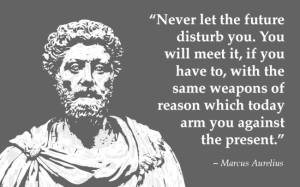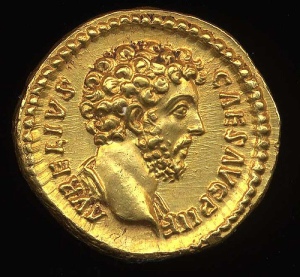 As I mentioned in a comment on a recent post, I’ve been reading Marcus Aurelius‘ Meditations. Its not the kind of book one just happens upon, there is a time when one turns to the thoughts of a long dead Roman and finds enough there that rings true today, an echo across the centuries…
As I mentioned in a comment on a recent post, I’ve been reading Marcus Aurelius‘ Meditations. Its not the kind of book one just happens upon, there is a time when one turns to the thoughts of a long dead Roman and finds enough there that rings true today, an echo across the centuries…
Its difficult enough to avoid the comment banal, that there has been no essential change in human nature in all of recorded human history, so I shall get it over with as soon as possible. As a fraction of evolutionary time, all recent history is vanishingly fleet, so it would be almost surprising if one did not find that there are words of Marcus Aurelius that sound like a discourse on contemporary events.
Meditations is a book designed to be dipped into, randomly, letting serendipity guide you to something that strikes, at that time, in that place… Which is always useful when looking at our situation on campus. The other day, for instance, I chanced upon his comment, That which does no harm to the state, does no harm to the citizen. (He repeats this idea many times in many ways- for instance in the quote I mentioned in my Convocation address this time around, That which is good for the swarm is good for the bee.) In the case of every appearance of harm apply this rule: if the state is not harmed by this, neither am I harmed. This adapts so well to us here and now: That which does no harm to the University, does no harm to the UoH faculty/student/staff. In the case of every appearance of harm apply this rule: if the University is not harmed by this, neither am I harmed.
Of course, this is only part of the quotation, since Marcus A goes on to say, But if the state is harmed, thou must not be angry with him who does harm to the state. Show him where his error is. In the face of those that harm the state or the University by throwing a spanner in the works- usually a legal one- it is difficult not to be angry… The amount of working time that is wasted in responding to those that file frivolous lawsuits against the University due to slights imagined and entitlements assumed, as well as to those that demand information that they have a right to, but demand for the wrong reasons… One could do so much that is useful with that time. But it does seem that MA was also plagued by similar demands, when he says,
 …remember withal that no man properly can be said to live more than that which is now present, which is but a moment of time. Whatsoever is besides either is already past, or uncertain. The time therefore that any man doth live, is but a little, and the place where he liveth, is but a very little corner of the earth, and the greatest fame that can remain of a man after his death, even that is but little, and that too, such as it is whilst it is, is by the succession of silly mortal men preserved, who likewise shall shortly die, and even whiles they live know not what in very deed they themselves are: and much less can know one, who long before is dead and gone.
…remember withal that no man properly can be said to live more than that which is now present, which is but a moment of time. Whatsoever is besides either is already past, or uncertain. The time therefore that any man doth live, is but a little, and the place where he liveth, is but a very little corner of the earth, and the greatest fame that can remain of a man after his death, even that is but little, and that too, such as it is whilst it is, is by the succession of silly mortal men preserved, who likewise shall shortly die, and even whiles they live know not what in very deed they themselves are: and much less can know one, who long before is dead and gone.
So much for legacies, and so much for the grand design. A deep message that runs through Meditations is that we are all connected–the intelligence of the world is social. This is fractally true, at level after level: more so the closer we look, the more connected we seem to be. So to adapt this aphorism to our time and place, the intelligence of this University is also social. This community needs to cohere: it can either be well-arranged […] or just a chaos huddled together, but still, it is our University, and it behooves us all to do the best we can with it, by it, and for it.
